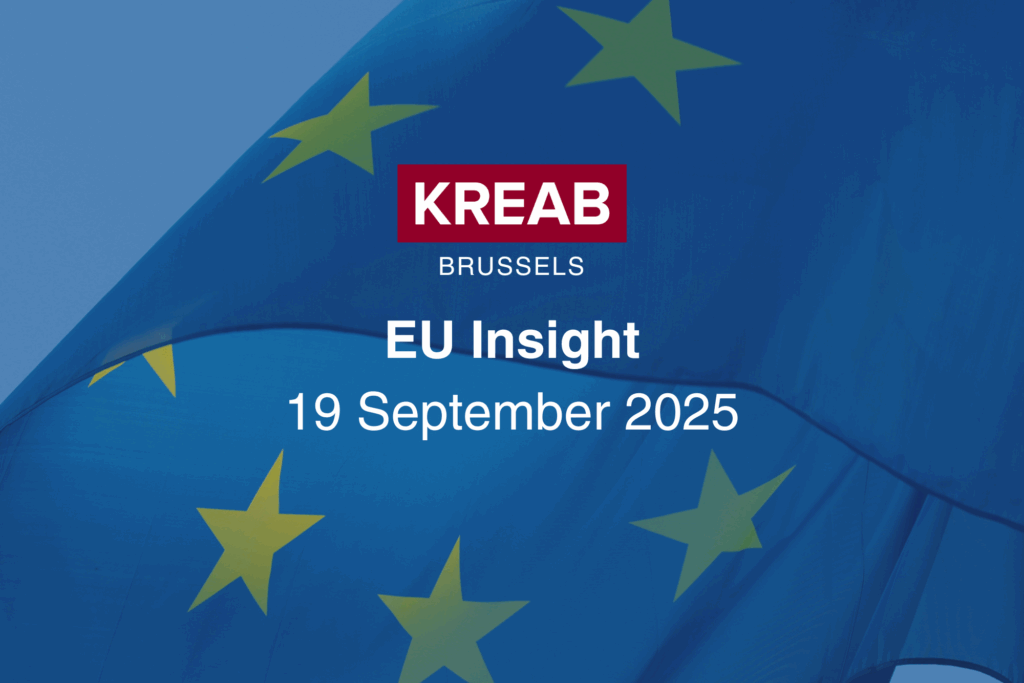
19/09/2025
EU Insight 19 September 2025
Brussels, 19 September 2025
COUNCIL APPROVES EU STATEMENT ON ITS 2025 PLANS TO CUT CARBON EMISSIONS
Ahead of the UN General Assembly, scheduled next week, Member States adopted a statement setting an indicative 2035 target for cutting carbon emissions between 66.25% and 72.5%, compared to 1990 levels. Indeed, under the Paris Agreement, signing members needs to update their so called nationally determined contribution (NDCs), outlining their efforts to reduce national emissions and adapt to the impacts of climate change, every five years. The statement of intent paves the way for the submission of the EU and Member States post-2030 NDCs ahead of COP30, building upon existing legislation such as the EU climate law and the 2040 climate targets. The UNFCCC will later work on a report compiling every signatory NDCs to inform the difference in ambition levels with the objectives of the Paris agreement.
COMMISSION CALLS FOR EU-ISRAEL AGREEMENT SUSPENSION AND SANCTIONS ON INDIVIDUALS
The Commission presented its proposals to suspend trade related provisions of its agreement with Israel as well as sanctions against Israeli extremist ministers, violent settlers and the Hamas. The move follows von der Leyen State of the Union address, where she called for pausing bilateral support to Israel, while still supporting Israeli civil society and Yad Vashem. Due to the worsening humanitarian crisis in in Gaza, Israel has been found in breach of its agreement with the EU concerning respect for human rights and democratic principles. If the proposals are approved by the Council, imports from Israel will lose preferential access to the EU market, institutional cooperation projects will be put on hold and restrictive measures against Hamas, as well as Israeli violent settlers and extremist ministers will be implemented.
COUNCIL OPENS UP DEFENCE INSTRUMENT TALKS TO UK & CANADA
The Council agreed to open negotiations with the United Kingdom and Canada regarding their participation in the new EU defence loan instrument, entitled Security Action for Europe (SAFE). Future negotiations will be led by the Commission to determine the specific conditions under which UK and Canada firms may be eligible for financing under the €150 billion fund. Both the UK and Canada possess security and defence partnerships with the EU, making them eligible to negotiations to tap into this instrument. Progress has also been made on private defence financing, with the EIB announcing a €450 million loan to French defence leader Thales, while the European Investment Fund and the Commission have jointly invested €30 million in the first fund exclusively financing the defence sector SMEs and midcaps.
COMMISSION UNVEILS NEW EU STRATEGIC AGENDA FOR INDIA
As part of the Commission political guidelines for 2024-2029, the Commission presented its new strategic agenda for its relationship, aiming to deepen cooperation on trade, technology, defence, industry and skills mobility. Notably, the Commission proposes to jointly build stronger supply chains and strengthen economic security within the Trade and Technology Council, as well as creating an EU-India Startup partnership or an association with the Horizon Europe programme. The EU’s efforts to further align India with the bloc’s geopolitical and economic interests is seen of increasing strategic importance notably in the context of the recent Shanghai Cooperation Organisation summit. In its communication, the Commission stressed yet again its commitment to concluding eighteen years of negotiations on a free trade agreement with India by the end of the year.
EU PRESENTS 19th SANCTIONS PACKAGE TARGETING RUSSIA AFTER WEEKS OF DISCUSSIONS
The Commission presented its 19th package of sanctions against Russia, seeking to increase economic pressure as the war in Ukraine drags on. The package entails a total ban on Russian LNG moving into Europe by January 2027, sanctions against 118 vessels from the shadow fleet, and the prohibition of crypto transactions suspected of circumventing sanctions. The new measures aim to further weaken Russia’s energy revenues by lowering the oil price cap, banning the transactions of major energy trading companies such as Rosneft and Gazpromneft, and freezing the assets of the purchasers of Russian oil in breach of the sanctions, including third-country refineries, oil traders, and petrochemical companies. The sanctions package will now move onto the Council and will requires the usual unanimous support from Member States.
COMING UP NEXT WEEK
- 22 – 23 September: Agriculture and Fisheries Council.
-
23-29 September: United Nations General Assembly.

Did you like this article? Contact us to hear more about Kreab Brussels’ practice and services.

